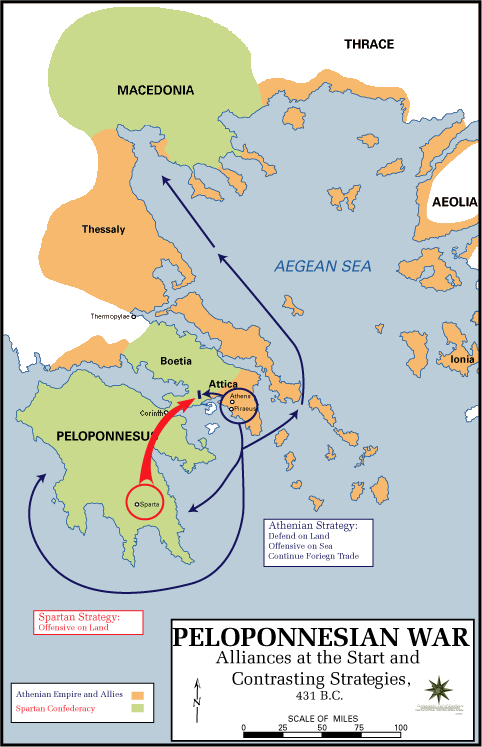 into a tiny, aging brain.
into a tiny, aging brain. So, while the Peloponnesian War was being waged, and miswaged, with all of the drama, and intrigue, and sex of an HBO Series (Spartan military pederasty makes Oz look like Mr. Rogers' Neighborhood)...
what else was going on?
(image from Wikipedia)
The Jews had rebuilt the Temple in Jerusalem. (Sad story)
The Nanda Empire was the regional hegemon in India.
In China, it was the Warring States period. The reforms of Lord Shang were still a few decades away... here's an extra credit project. Was Lord Shang the original incarnation of Josef Stalin? During the NEP, I mean? Discuss, including references to Pol Pot, the Cultural Revolution and the Jacobite Terror.
In Mexico, the Olmec teetered on the edge of collapse...
the Celts were running Western Europe, the Scythians were running Eastern Europe and Central Asia (Ateus had just taken the throne of the Second Scythian Kingdom), the Balts had made the East Coast of the Baltic into their homeland, proto-Slavs (the Neuri?) were east of them...
North America had the Adena culture in the midwest, and Pueblo culture further west.
It was the Patrician era of the Roman Republic, Carthage and Syracuse dominated the Western Mediterranean, the Nok were present in Nigeria (and I can't find anything out about them *snarl*), The Kushites maintained a wealthy Kingdom in Sudan, southeast of them the kingdom of Axum must already have been founded...
the big boy on the block was the Persian Empire. Despite having been driven off from Greece twice, it was still overwhelmingly the largest, most powerful Empire on Earth until that time. It would remain so for another two generations, until Alexander conquered it. It stretched from Turkey to the Indus, and included Egypt.
You can see why I use the term "wedge". I've got two short things to read next, one book on the construction of ethnicity (I WILL get to the bottom of this tribe thing), and then a 1500 year digression to the Epic of Gilgamesh.
I'm not looking forward to that, even marginally. My memory of it is that it's unreadable. Not at all a potential HBO series.
I really like what you're doing here. It seems to me that the Human brain prefers to learn things linearly, but concentrating only on one subject, character, or people at a time. This makes it very confusing when two completely different groups of people intersect.
ReplyDeleteUnderstanding the big picture in the world is quite difficult. Your mind has to learn to associate the names Ateus and Nanda as being related in some way; names clearly of a different language and culture. Perhaps an attempt should be made to teach history as a purely chronological subject, making progress undoubtedly slower, but eliminating the confusion that comes from, for instance, the Romans conquering Celts that up until a few days ago, you thought only lived in the British Isles.
Also, this subject relates somewhat to your issues in reading the Epic of Gilgamesh (one of my favorites). The Mesopotamians didn't have the same culture of story telling that we do. They wouldn't understand the concept of story arch or character development. And the result is that the Epic itself is incredibly difficult for us to read.
Essentially, the story is hard for us to understand because culturally, we do not learn the same way it is written. Just the same as we don't learn History as history actually occurred. We learn it one completed story at a time. And the Epic of Gilgamesh is hardly a completed story.
Perhaps this is because The Epic is probably related to a real king who ruled Sumeria during the early dynastic period. It may be that its seemingly haphazard story structure derives from the fact that its nothing more than an amalgamation of propaganda, widely accepted by the Sumerians and then finally collected into one confusing whole by the Akkadians.
I'm working on a visual aid to the whole parallel history; I'd like to replicate some of the maps you've seen in my historical atlases (if that's the proper plural), except on a map of the globe.
ReplyDeleteIt's interesting you brought up the Celts. I spent the day indexing the History of the Gallic Wars. Slow learners, those Celts. Or else, gallantly committed to their liberty.
You're exactly correct about the Sumerians of course. Except, you're not considering the effect of the Snowcrash virus.
I'll have the Caesar citations in the database for you tomorrow, if you're interested.